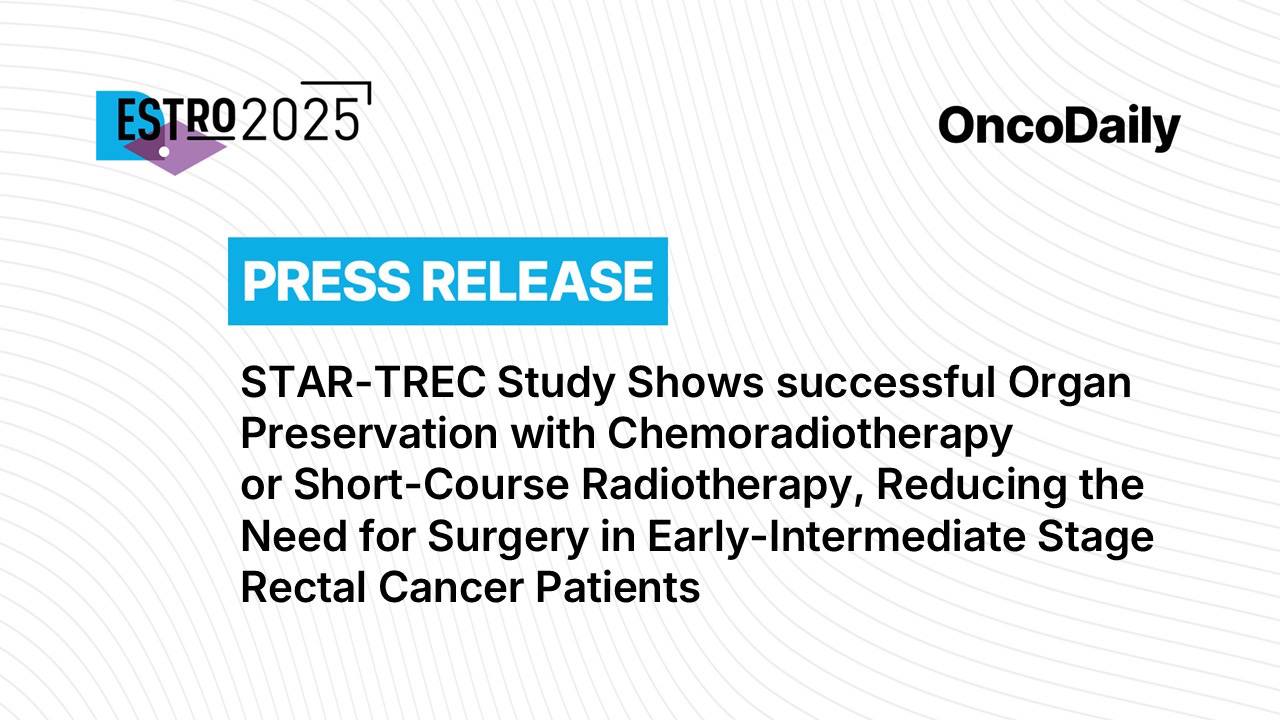
STAR-TREC Study Shows successful Organ Preservation with Chemoradiotherapy or Short-Course Radiotherapy, Reducing the Need for Surgery in Early-Intermediate Stage Rectal Cancer Patients
Vienna, Austria — A major international clinical trial, STAR-TREC, has shown that many patients with early- and intermediate-stage rectal cancer can safely avoid radical surgery if their tumour has completely disappeared following radiotherapy. The results, presented at ESTRO 2025, suggest a transformative shift in treatment strategies, with the potential to significantly improve quality of life and reduce the number of permanent stomas globally.
Radical surgery has long been the standard of care for early and intermediate-stage rectal cancer, involving the removal of the tumour, rectum, and surrounding tissues. While effective, this approach often results in serious long-term side effects such as faecal incontinence, sexual dysfunction, and in many cases, the need for a permanent stoma. The STAR-TREC trial, a phase II/III randomised study, aimed to investigate whether some patients could safely be treated with radiotherapy-based organ-preserving strategies instead of surgery.
The study enrolled 344 patients across 37 international sites, comparing two radiotherapy approaches:
-
Short-course radiotherapy (five high-intensity outpatient sessions), and
-
Long-course chemoradiotherapy (25 sessions of lower-intensity radiotherapy combined with chemotherapy).
Key Findings:
-
At one year, 80% of patients treated with long-course chemoradiotherapy and 61% of those treated with short-course radiotherapy avoided radical surgery.
-
Both treatments were well tolerated, with minimal short-term toxicity.
-
The trial provides strong evidence in support of wider use of organ-preserving strategies in rectal cancer treatment.
“The results suggest that a non-surgical approach may be a feasible option for some patients with early or intermediate-stage rectal cancer. This strategy has the potential to preserve bowel function and reduce the likelihood of requiring a permanent stoma, which could positively impact quality of life.”
Impact on Clinical Practice and Future Research
The STAR-TREC trial is the first randomised trial to directly compare standard surgery with non-surgical, radiotherapy-based treatments in rectal cancer. Its results could reshape clinical guidelines and prompt more widespread adoption of non-surgical management approaches.
“These findings are of major importance as they challenge the long-held assumption that surgery is necessary for all rectal cancer patients, showing that both long and short radiotherapy regimens are viable alternatives.”
The results pave the way for more personalised, patient-centred treatment options. As ongoing follow-up continues to assess long-term outcomes such as cancer regrowth and survival, the STAR-TREC study represents a critical advancement in the global effort to make rectal cancer care more humane and less invasive.
About ESTRO 2025
ESTRO 2025 brings together around 7,000 participants from over 80 countries, showcasing the latest research in clinical radiation oncology, radiobiology, medical physics, technology, and brachytherapy. Leading doctors and scientists from around the world present groundbreaking findings, in line with the conference theme: “Transformative innovation through collaboration”. ESTRO 2025 is the annual congress of the European Society for Radiotherapy and Oncology (ESTRO), an organisation dedicated to advancing cancer treatment through radiotherapy and multimodal approaches. ESTRO promotes education, science, and research and advocates for universal access to radiotherapy. With nearly 10,000 members worldwide, it supports radiation oncology professionals and the broader oncology community in their daily practice.
Read ESTRO 2025 Updates on OncoDaily

-
Challenging the Status Quo in Colorectal Cancer 2024
December 6-8, 2024
-
ESMO 2024 Congress
September 13-17, 2024
-
ASCO Annual Meeting
May 30 - June 4, 2024
-
Yvonne Award 2024
May 31, 2024
-
OncoThon 2024, Online
Feb. 15, 2024
-
Global Summit on War & Cancer 2023, Online
Dec. 14-16, 2023
